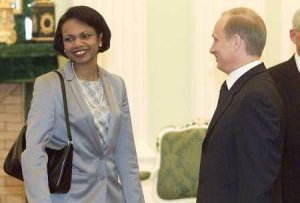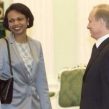
RUSSIAN OBSERVERS ASSESS CONDI’S VISIT
Publication: Eurasia Daily Monitor Volume: 2 Issue: 79
By:

The Russian press has been mulling the significance of U.S. Secretary of State Condoleezza Rice’s visit to Moscow this week. And while most observers noted her criticism of the Kremlin for what she characterized as its excessive centralization of power and restrictions on the media, some thought that her criticism was rather mild.
Rice was most forceful while briefing journalists en route to Moscow on April 19. She told the press, “The centralization of state power in the presidency at the expense of countervailing institutions like the Duma or an independent judiciary is clearly very worrying” and the “absence of an independent media on the electronic side is clearly worrying.” Still, she stressed, “It’s a mixed picture, but it’s not the Soviet Union” and “there are also then a lot of trends of progress in Russia” (usinfo.state.gov, April 20).
During her live interview in Moscow on April 20 with the independent Ekho Moskvy radio station, Rice stated: “All that we are saying is that for U.S.-Russian relationships to really deepen, and for Russia to gain its full potential, there needs to be democratic development. There should not be so much concentration of power just in the presidency. There needs to be an independent media. It’s wonderful to be on Ekho Moskvy. There needs to be more independent media outlets in Russia so that people can debate and decide together the democratic future of Russia.” Asked why the United States “attaches so much importance” to the Yukos case, Rice responded: “Everyone will be watching to see what the Yukos case says about the rule of law in Russia. It did raise concerns about what was going on in terms of the courts and the rule of law. I know that there will soon be a verdict and we, and investors, and the rest of the international community will hope that it is a process that inspires confidence that the rule of law obtains in Russia” (usinfo.state.gov, April 21). A verdict in the trial of former Yukos CEO Mikhail Khodorkovsky is expected on April 27. Prosecutors have demanded that Khodorkovsky, who is accused of tax evasion and fraud, among other crimes, be sentenced to 10 years in prison.
During the press briefing she gave en route from Moscow to Vilnius, Lithuania, Rice described her meetings with President Vladimir Putin, Foreign Minister Sergei Lavrov, and Defense Minister Sergei Ivanov largely in positive terms. She was also softer in describing areas of disagreement, limiting her criticism to stating that she thought some of the Kremlin’s decisions “have not been good in the direction of the establishment of truly competitive democratic institutions” and reiterating that people will be watching the Yukos case “for signals that indeed there is rule of law in Russia.”
Rice did not mention the issue of human rights abuses in Chechnya in her public statements in Moscow. While she was there, the Council of Europe’s Commissioner for Human Rights, Alvaro Gil-Robles, released a report that, among other things, stated that while the situation in Chechnya “began to improve slightly in the course of the past year,” the problem of disappearances there remains “a vital issue” and that “the missing people must be searched for and their disappearances explained” (coe.int, April 20).
Against this backdrop, it is understandable why some Russian observers felt that Rice’s criticism of the Putin administration amounted to a slap on the wrist. “Even speaking today on the moderate opposition radio station Ekho Moskvy, Rice expressed virtually no critical wishes regarding the Russian authorities,” Ivan Yartsev wrote on the Center for Political Technologies’ website. “True, speaking about the Yukos affair, which, according to the secretary of state, the United States is following with close attention, she noted that “questions regarding the courts and the rule of law arise” frequently, inasmuch as that in the United States, the Yukos case is regarded as an indicator of the rule of law in Russia. However Condoleezza Rice more than made up for that toughness with her own position on Yukos, stating that Russia can and will develop democracy without resorting to revolution. ‘We do not fear for the future of Russia, it can be a very bright future,’ Rice literally said, emphasizing that the United States had no desire to reduce Russian influence in the post-Soviet area” (politcom.ru, April 20).
Writing in Kommersant, Sergei Strokan opined that Rice’s visit suggested that U.S. policy toward “authoritarian” Russia mirrors the kind of “constructive engagement” approach that Europe has taken toward “authoritarian” Iran, much to the chagrin of the American administration. “This posture is actually very convenient for Russia,” he wrote. “It allows us to maintain the status quo in relations with America for as long as we like, while persuading ourselves that agreeing to disagree is also a kind of agreement. In this situation, Vladimir Putin is a winner. But is George Bush a winner? ‘Constructive engagement,’ which would seem to be good for everyone, does have one problem, and it is serious. The example of Iran, once again, shows that the results of this kind of homeopathy are close to nil. Many years of trying to instill democratic values in that country have not moved Iran a millimeter closer to democracy. It is not hard to predict, for the years ahead, what will be the result of Washington’s current ‘constructive engagement’ with Moscow.”




